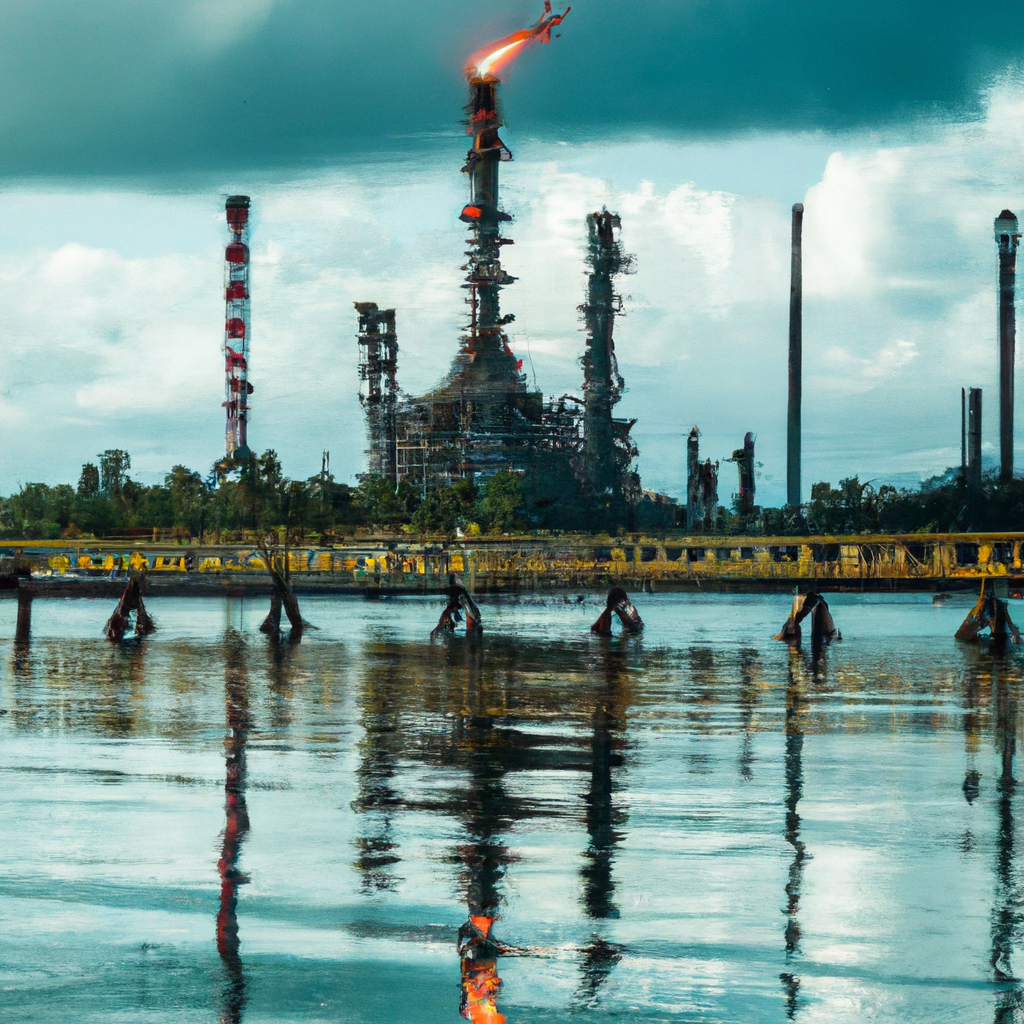Curious about Suriname’s oil and gas industry? Take a peek into this fascinating sector as we uncover the country’s potential and opportunities. Suriname, often hailed as the hidden gem of South America, has been making waves in the energy sector with its recent discoveries and investments. With a rich reserve of natural resources waiting to be tapped into, Suriname promises exciting prospects in the world of oil and gas. Join us as we navigate through the depths of this industry, revealing the potential for growth and its implications for the country’s economy and sustainability.
Suriname’s Oil and Gas Industry Overview
Suriname, a small country located on the northeastern coast of South America, is rapidly emerging as a new player in the global oil and gas industry. With a rich history of exploration and recent major discoveries, the country’s oil and gas sector is poised for significant growth and development. In this article, we will delve into the historical background, current status, and economic impact of Suriname’s oil and gas industry.
Historical Background
Suriname’s oil and gas industry has its roots in the early 20th century when exploratory drilling activities first began. However, it wasn’t until the late 1960s that significant oil discoveries were made, leading to a surge in exploration activities. Despite initial excitement, Suriname faced numerous challenges, including political instability and regulatory uncertainties, which hampered the growth of the industry.
Current Status
Fast forward to the present day, Suriname is once again in the spotlight due to recent major oil discoveries in its offshore waters. In early 2020, multinational oil and gas companies, including Apache Corporation and Total, made significant oil discoveries in the Block 58 area, indicating vast potential for the country’s oil reserves. The successful drilling campaigns have triggered renewed interest from international investors and have put Suriname on the map as an emerging oil and gas destination.
Economic Impact
The burgeoning oil and gas industry in Suriname has the potential to transform the country’s economy and significantly impact its future development. The newfound reserves are expected to attract substantial investments in exploration, production, and infrastructure, leading to job creation, increased revenue, and enhanced export capabilities. As Suriname develops its oil and gas resources, it can diversify its economy and reduce its dependency on traditional industries such as mining and agriculture.
Exploration and Production
Exploration and production play a pivotal role in the success and sustainability of Suriname’s oil and gas industry. Continued exploration efforts are essential to identify new reserves and expand the country’s resource base. Additionally, efficient production techniques and technologies are needed to maximize oil and gas recovery.
Key Players
Several international oil and gas companies have entered Suriname’s market to capitalize on the recent discoveries. Apache Corporation and Total, through their joint venture, have been at the forefront of exploration activities in Block 58. Other major players include Petronas, Kosmos Energy, and ExxonMobil, which have previously shown interest in Suriname’s offshore potential. The involvement of these key players underscores the industry’s significance and highlights Suriname’s attractiveness as an investment destination.
Major Discoveries
Suriname’s recent oil discoveries have been a game-changer for the country’s oil and gas industry. The exploration campaign in Block 58 has yielded exceptional results, with significant hydrocarbon accumulations found in the Keskesi and Sapakara West wells. These discoveries indicate the presence of substantial oil reserves, potentially on par with the neighboring oil and gas-rich countries in the region.
Challenges and Opportunities
While Suriname’s oil and gas industry holds immense promise, it also faces several challenges. One of the key hurdles is the lack of infrastructure to support exploration and production activities. The country needs to invest heavily in pipeline networks, export terminals, and other related infrastructure to ensure efficient operations. Additionally, Suriname must address environmental concerns and implement sound regulatory frameworks to safeguard its natural resources. Despite these challenges, Suriname presents significant opportunities for investors, technological providers, and local businesses to contribute to the industry’s growth.

Infrastructure and Transportation
Effective infrastructure and transportation systems are critical for the successful development of Suriname’s oil and gas industry. The efficient movement of resources, such as crude oil and natural gas, from production sites to export terminals is vital for economic viability and sustainability.
Oil and Gas Fields
Suriname’s offshore waters hold tremendous potential for oil and gas exploration and production. The Block 58 area, where recent large discoveries have been made, is expected to be the epicenter of the country’s oil and gas activities. The Keskesi and Sapakara West oil fields within Block 58 have been identified as significant reserves. With further exploration, additional fields are likely to be discovered, expanding Suriname’s resource base.
Pipeline Networks
The establishment of pipeline networks is crucial for transporting oil and gas from the offshore fields to export terminals. Suriname must invest in the construction of pipelines that connect production sites to onshore facilities, ensuring swift and efficient movement of resources. The development of a robust pipeline network will facilitate the export of oil and gas, benefiting both the country and its international partners.
Export Terminals
Export terminals provide the necessary infrastructure for loading oil and gas onto ships, enabling their transportation to global markets. Suriname must construct export terminals capable of handling large volumes of crude oil and natural gas. These terminals should incorporate advanced technologies to ensure efficient loading and unloading operations. The construction of modern and well-equipped export terminals will enhance Suriname’s capacity to export its resources and generate substantial revenue.
Regulatory Framework and Policies
A robust regulatory framework and well-defined policies are essential for the orderly development and sustainable growth of Suriname’s oil and gas industry. Clear laws and regulations help provide a conducive environment for international investors, ensure responsible resource management, and protect the country’s environment.
Laws and Regulations
Suriname has been working diligently to establish comprehensive laws and regulations to govern its oil and gas sector. The government has implemented a legal framework that covers various aspects, including licensing, exploration, production, and environmental protection. By enacting transparent and investor-friendly laws, Suriname aims to encourage foreign direct investment and promote long-term stability in the industry.
Environmental Concerns
As Suriname expands its oil and gas activities, environmental concerns become paramount. The government must prioritize environmental protection and implement stringent regulations to minimize the industry’s ecological footprint. Sustainable practices, such as leak detection and repair programs, waste management strategies, and the use of advanced technologies to reduce emissions, should be integral components of Suriname’s regulatory framework. By addressing these concerns proactively, Suriname can mitigate potential environmental risks and ensure the responsible development of its resources.
Investment Incentives
In order to attract foreign investment and facilitate the growth of Suriname’s oil and gas industry, the government has established investment incentives. These incentives may include tax incentives, financial assistance programs, and favorable fiscal terms. By offering attractive incentives, Suriname aims to stimulate investments in exploration, production, and infrastructure projects, while also promoting technology transfer and knowledge sharing among industry players.

International Cooperation and Partnerships
International cooperation and partnerships play a vital role in the development of Suriname’s oil and gas industry. Collaboration with global players and regional stakeholders can provide Suriname with access to advanced technologies, expertise, and investment opportunities.
Global Players
Suriname’s emerging oil and gas industry has attracted the attention of global players, including major multinational oil and gas companies. These global players bring significant expertise, financial resources, and advanced technologies to the country. The partnerships between Surinamese authorities and these global companies create opportunities for knowledge transfer, capacity building, and long-term collaboration.
Regional Collaboration
Suriname’s proximity to other oil and gas-rich countries in the region presents opportunities for regional collaboration. The country can leverage existing partnerships and initiatives, such as the Caribbean Community (CARICOM) and the Union of South American Nations (UNASUR), to foster regional cooperation in the energy sector. By collaborating with neighboring countries, Suriname can share best practices, jointly develop infrastructure projects, and explore opportunities for the development of regional energy markets.
Technical Assistance
Suriname, as an emerging player in the oil and gas industry, can benefit from technical assistance programs offered by international organizations and governments. Technical assistance can include support in areas such as capacity building, regulatory frameworks, environmental management, and technology transfer. By leveraging these programs, Suriname can enhance its industry capabilities, mitigate potential risks, and ensure sustainable development.
Economic Diversification and Local Participation
Suriname’s oil and gas industry can be a catalyst for economic diversification and local participation. By leveraging the sector’s potential, Suriname can create new business opportunities, generate employment, and maximize the socio-economic benefits for its citizens.
Downstream Industries
The development of downstream industries is a crucial component of Suriname’s economic diversification strategy. Downstream activities, such as refining, petrochemical production, and liquefied natural gas (LNG) processing, can add value to Suriname’s oil and gas resources. By investing in downstream industries, Suriname can enhance its domestic capabilities, reduce dependence on imported refined products, and capture a larger share of the value chain.
Job Creation
The growth of Suriname’s oil and gas industry will undoubtedly lead to job creation across various sectors. As the industry continues to expand, there will be a need for skilled professionals in areas such as engineering, geosciences, logistics, and project management. The development of oil and gas-related infrastructure will also create employment opportunities in construction and maintenance. Suriname’s government should focus on implementing training programs and promoting local workforce participation to ensure that citizens benefit from job opportunities.
Local Content Development
Promoting local content development is crucial to ensuring that Suriname’s citizens actively participate in and benefit from the oil and gas industry. Suriname should encourage multinational companies operating in the country to prioritize the use of local goods and services, hire local talent, and transfer knowledge and technology to local stakeholders. By fostering local content development, Suriname can foster economic growth, improve skills and expertise, and create a sustainable and inclusive industry.
Social Impact and Sustainability
Suriname’s oil and gas industry should be developed in a manner that ensures positive social impact and long-term sustainability. It is essential to prioritize community development, corporate social responsibility, and environmental stewardship.
Community Development
Community development initiatives are crucial for ensuring that Suriname’s citizens benefit from the oil and gas industry. Suriname should invest in social infrastructure, such as healthcare facilities, schools, and affordable housing, to improve the quality of life for its citizens. Additionally, the industry should provide opportunities for local businesses to grow and thrive, thereby stimulating economic development at the community level.
Corporate Social Responsibility
Corporate social responsibility (CSR) plays a vital role in the sustainable development of Suriname’s oil and gas industry. Oil and gas companies operating in the country should embrace CSR practices by investing in local communities, supporting education and training programs, and promoting environmental conservation. By actively engaging in CSR initiatives, these companies can demonstrate their commitment to promoting the well-being of Suriname’s people and protecting the environment.
Environmental Stewardship
Suriname’s oil and gas industry must prioritize environmental stewardship to minimize its ecological impact. The industry should adopt environmentally friendly practices, such as reclamation of drilling sites, proper waste management, and adoption of renewable energy sources. Suriname should also consider investing in research and development of clean technologies to minimize greenhouse gas emissions and reduce reliance on fossil fuels. By prioritizing environmental stewardship, Suriname can ensure the sustainable development of its oil and gas resources.
Future Prospects and Challenges
Looking ahead, Suriname’s oil and gas industry faces both exciting prospects and significant challenges. Understanding and addressing these factors will be crucial for the industry’s long-term success and growth.
New Exploration Opportunities
Suriname’s recent discoveries have opened up new exploration opportunities in its offshore waters. Further exploration campaigns need to be conducted to identify additional oil and gas reserves, assess their commercial viability, and attract new investments. Sustained exploration efforts are vital to continually expand Suriname’s resource base and maintain its position as an emerging player in the global oil and gas industry.
Competing Energy Sources
The global energy landscape is rapidly evolving, with a growing focus on renewable energy sources and the global transition to a low-carbon future. Suriname must carefully consider these trends and their potential impact on the oil and gas industry in the long run. The country should strive to strike a balance between its oil and gas resources and its commitment to sustainability, exploring opportunities for renewable energy development while continuing to maximize the benefits of its hydrocarbon reserves.
Government Priorities
The priorities set by Suriname’s government play a critical role in shaping the future of the oil and gas industry. The government should focus on creating a stable and transparent regulatory environment, attracting investment, and ensuring equitable distribution of the industry’s benefits. It is imperative for the government to strike a balance between revenue generation, environmental protection, and social development. By setting clear priorities and effective policies, the government can steer Suriname towards a sustainable and prosperous future.
Investment Opportunities
Suriname’s oil and gas industry presents attractive investment opportunities across the value chain. From upstream investments in exploration and production to infrastructure projects and the development of a robust service industry, there are numerous avenues for investors to participate in Suriname’s emerging oil and gas sector.
Upstream Investments
Investors can participate in upstream activities by partnering with oil and gas companies engaged in exploration and production. Direct investments in drilling campaigns, geological studies, and seismic surveys can provide opportunities for high returns in the event of new discoveries. Additionally, investments in production technologies, equipment, and expertise can contribute to enhancing operational efficiency and driving long-term profitability.
Infrastructure Projects
Suriname’s need for infrastructure presents investment opportunities for companies specializing in pipeline construction, export terminal development, and related projects. Investments in the construction of efficient pipeline networks, storage facilities, and export terminals can yield significant returns as the country continues to expand its oil and gas operations. Infrastructure projects play a crucial role in supporting industry growth and ensuring the efficient movement of resources to global markets.
Service Industry Potential
The development of Suriname’s oil and gas industry creates substantial opportunities for the service sector. Companies specializing in drilling services, logistics, engineering, and environmental consulting can provide valuable support to oil and gas operators. Suriname’s focus on local content and capacity building also opens up avenues for local businesses to offer a wide range of services, further stimulating the domestic economy.
Conclusion
Suriname’s oil and gas industry is at a transformative stage, with recent major discoveries bringing newfound attention and opportunities to the country. By capitalizing on its oil and gas resources, Suriname has the potential to drive economic growth, create jobs, and enhance its overall development. However, it is crucial for Suriname to strike a balance between maximizing the benefits of its hydrocarbon reserves and ensuring long-term sustainability. Collaborative efforts between government, international partners, and local stakeholders will be pivotal in shaping the industry’s future and delivering shared prosperity for Suriname’s citizens. As Suriname continues to navigate the complexities of its oil and gas industry, it must learn from the experiences of other countries in order to successfully manage and optimize its newfound potential.
